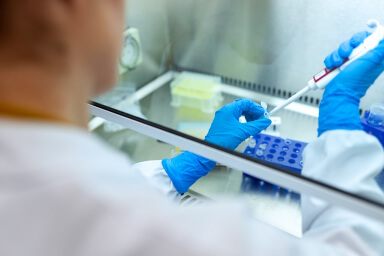Wound Pathogen Testing in Houston
Chronic wounds impact the health of over 8 million people in the United States each year. Chronic wounds include diabetic foot ulcers, pressure or decubitus ulcers, venous leg ulcers, and nonhealing surgical-site infections.

The annual incidence of foot ulcers in diabetic patients is 1% to 4% in the United States, with a lifetime risk of occurrence of between 15% and 25%. Approximately 85% of amputations are preceded by these types of ulcers. Pressure/decubitus ulcers are a common problem in nursing home, rehabilitation clinics and home-care populations; venous leg ulcers affect as many as 1% of the worldwide population. Surgical-site infections occur in as many as 5% of procedures and are an increasingly common type of postoperative complication; an average of 0.5% of the total hospital budget in the United States is allocated to manage these infections in affected patients.
Infection is the most important cause of delayed healing in healing of chronic open wounds. If neglected it can progress from contamination to colonization and local infection through to systemic infection, sepsis and multiple organ dysfunction syndrome, and it can be life-threatening. The clinical presentation of infected wounds includes fever, erythema, edema, induration, increased pain, and a change in drainage to a purulent nature. However, symptoms of infection in chronic wounds or debilitated patients may be more difficult to distinguish. In these cases, diagnosis may rely on non-specific symptoms such as loss of appetite, malaise, or decrease in glycemic control in diabetics.
Most infected wounds are caused by bacterial colonization, originating either from the normal flora on the skin, or bacteria from other parts of the body or the outside environment. A bacterial biofilm is a structured community of microorganisms encased in an exo-polysaccharide or exo-polymeric substance, which adheres to an inert or living surface. Biofilms are polymicrobial and may consist of not only bacterial cells but also fungi, viruses, proteins, extracellular DNA, and other biogenic factors. The most common infection-causing bacteria is Staphylococcus aureus and other types of staphylococci. The other bacterial species that cause wound infections are Pseudomonas aeruginosa, Klebsiella pneumoniae, Enterococcus faecalis and Acinetobacter baumannii.
Accurate and prompt identification and determination of Wound Pathogen Testing in Houston is key to proper wound management for patients suffering from pathogenic infection. For many years identifying the bacteria has meant culturing them in the laboratory. However, fewer than 2% of all known bacteria can be grown “routinely” in the clinical microbiology laboratory and Yeast: such as Candida albicans are rarely identified by culture. The Polymerase Chain Reaction (PCR) is a molecular technique utilized to target and “amplify” a single or few copies of a piece of DNA, generating thousands to millions of copies of a particular DNA sequence thereby allowing them to be detected. This technology is sensitive, specific and can be done in hours. When antibiotics targeting these other bacteria are used, the patients respond to the therapy. Raazi Clinical Laboratory`s wound panel PCR testing can identify which type(s) of bacteria are causing the infection, and which antibiotic would best treat the infection and help heal the wound.
Pathogens
| Acinetobacter baumannii | Clostridium novy | Bacteroides fragilis |
| Citrobacter freundii | Enterobacter aerogenes | Enterobacter cloacae |
| Clostridium septicum | Enterococcus faecalis | Enterococcus faecium |
| Escherichia coli | Clostridium perfringens | Klebsiella oxytoca |
| Klebsiella pneumoniae | Morganella morganii | Kingella kingae |
| Proteus mirabilis | Proteus vulgaris | Pseudomonas aeruginosa |
| Staphylococcus aureus | Aspergillus | Aspergillus niger |
| Streptococcus agalactiae | Candida dubliniensis | Candida glabrata |
| Candida krusei | Candida tropicalis | Candida albicans |
| Streptococcus pyogenes |
Resistance Markers
| VIM-CarbB | blaOXA-48 | IMP-1-CarbB |
| KPC-CarbA | blaACT | mefA |
| BlaNDM-1 | qnrA | qnrS |
| vanA | vanB | mecC |
| mecA |